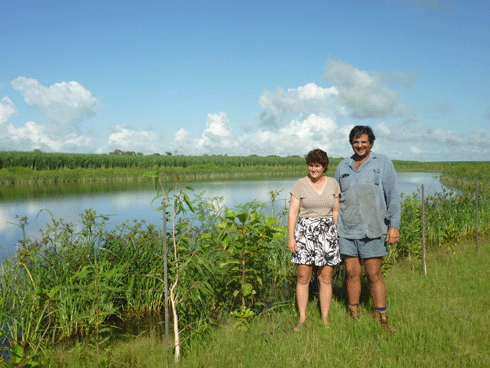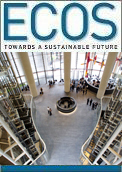
|
Published: 13 March 2012
Cane farmers open their gates to the public
Lower Burdekin cane farmers are opening their gates to the public to showcase innovative farming practices that reduce negative impacts on the Great Barrier Reef.
Farmers Will and Johnellan Lucas and Vince and Rita Papale, participants in the Great Barrier Reef Marine Park Authority's Reef Guardian Farmers program, are keen to share their ideas with the community and other growers.
The Reef Guardian Farmers program encourages sugar cane farmers, banana plantation farmers and cattle graziers to work together to improve efficiencies in the use of water, fertiliser, herbicides and pesticides, and to preserve the natural values of downstream habitats.
‘We really need to look at the opportunities and constraints together because the cane industry has a big influence on the water flowing through the wetlands and to the Great Barrier Reef,’ says Mr Papale.
Mr Papale’s family has been growing cane on their property in the Burdekin region since 1976. ‘After two generations of farming I had been watching some trends - most significantly, yields were declining whilst the costs of production kept increasing,’ he says.
Recently the Papales have improved yields through understanding and adjusting their water use, and have reduced their production costs by fine-tuning fertiliser applications. Mr Papale believes that managing water resources in the Burdekin is the key to sustainable farming and protecting the Reef.
Will and Johnellen Lucas have also adjusted irrigation practices on their cane farm to conserve water and are installing a water recycling pit to capture run-off.
‘These changes have helped us to halve our water use since my father farmed here, from 40 megalitres to 20 megalitres per hectare,’ Mr Lucas says.
Local program participants will meet with technical advisors and industry representatives to discuss their work, before touring local properties that have new irrigation and fertiliser systems, a water recycling pit, and a newly established wetlands area.
Source: Great Barrier Reef Marine Park Authority
More information |
For more information, contact Kate Steel at the Great Barrier Reef Marine Park Authority on +61 (0)7 4951 3454. |
Also see, ECOS story on Great Barrier Reef water quality initiatives, including Reef Rescue and Project Catalyst |




